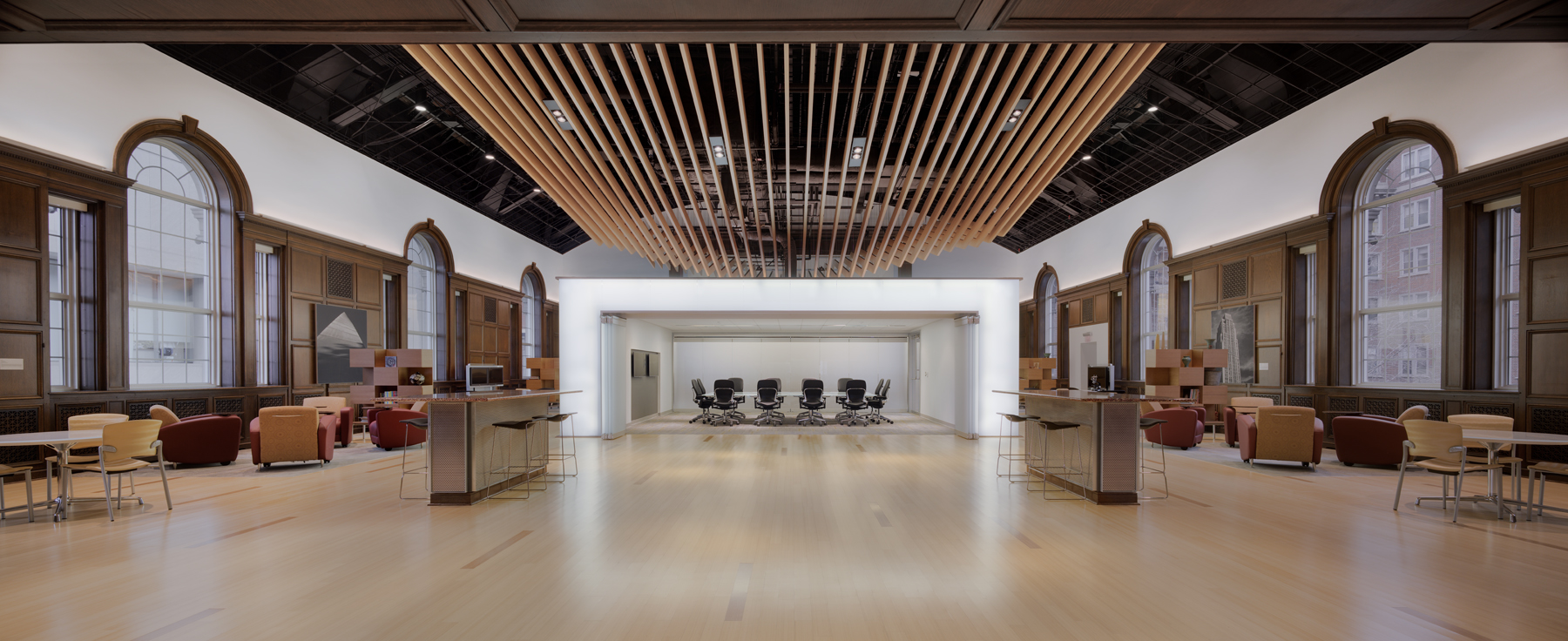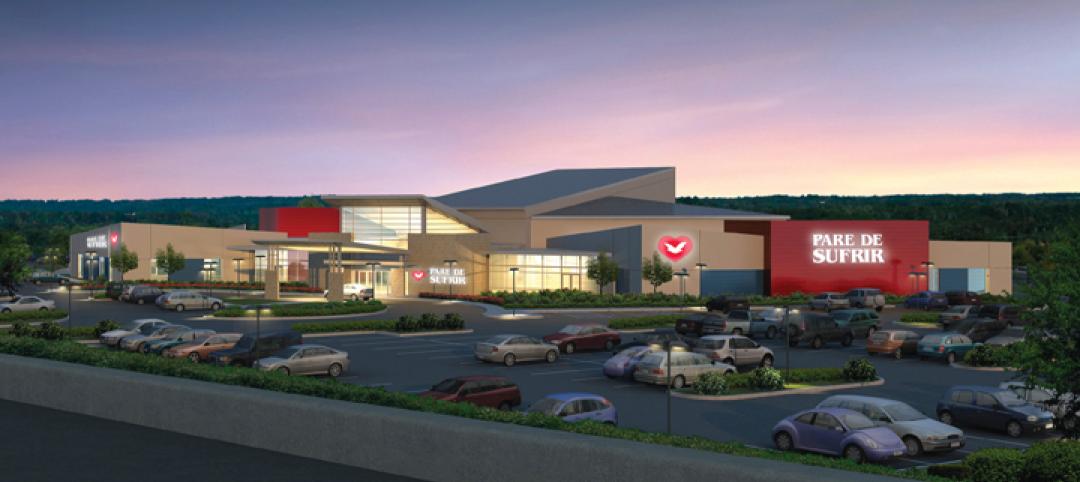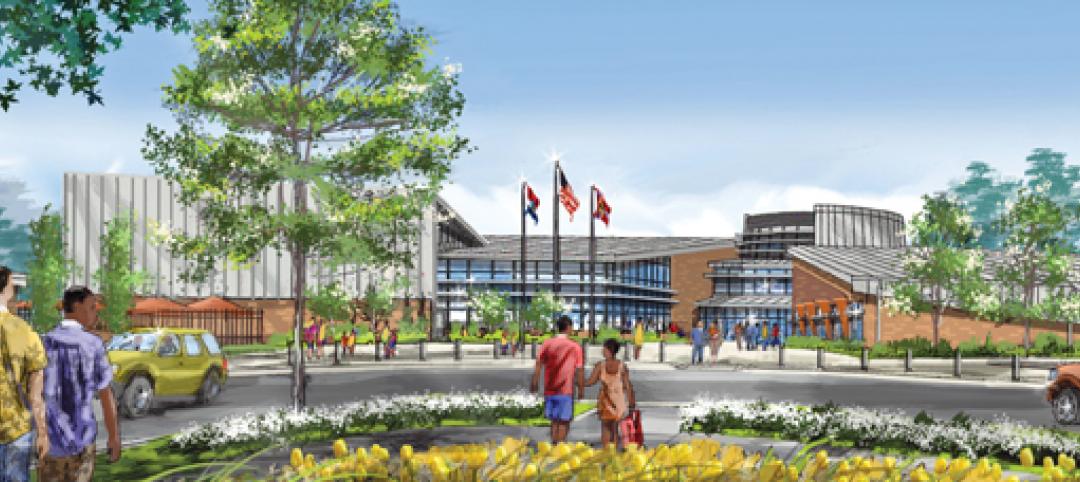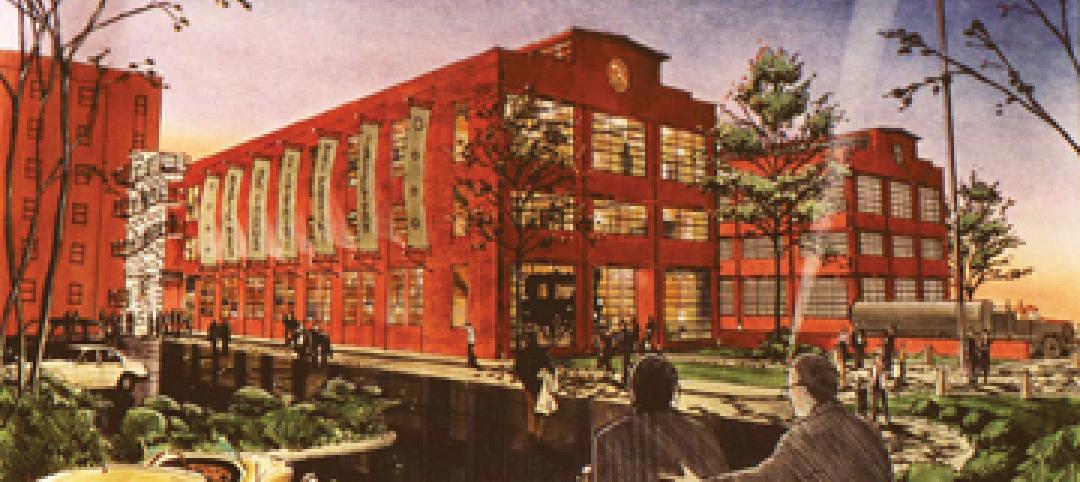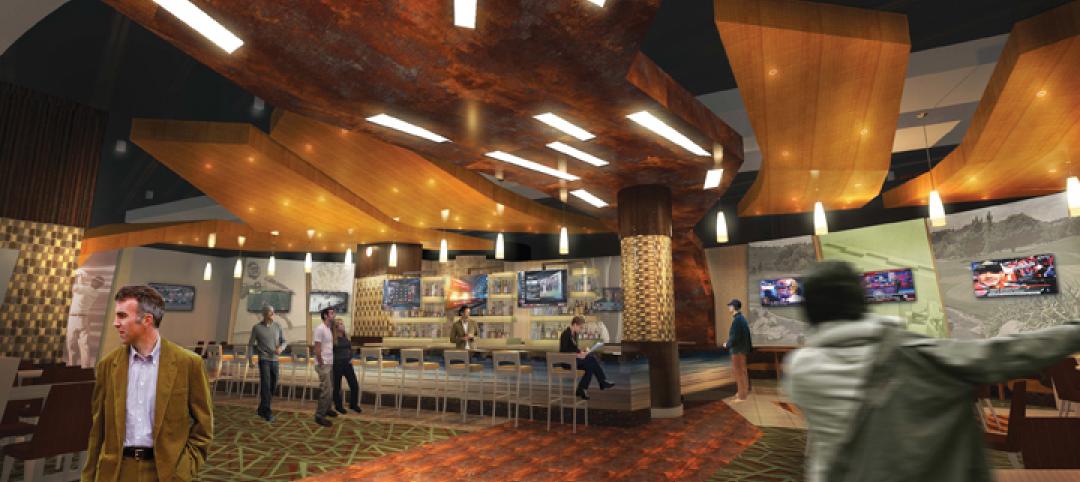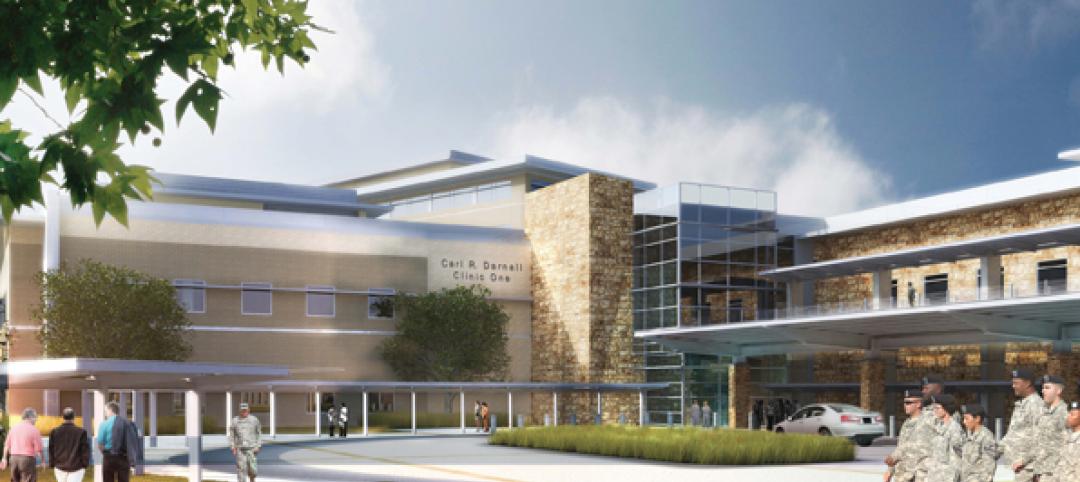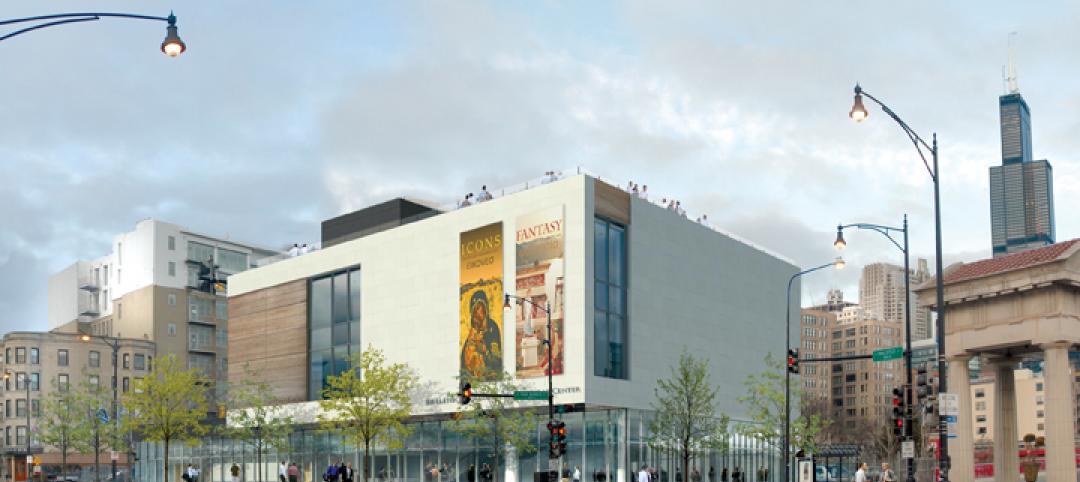Welcome to the third installment of Building Design+Construction’s “Great Solutions,” highlighting 14 innovative technologies and products that you can put to work in your next project. Readers are encouraged to submit entries for future Great Solutions; if we use yours, you’ll earn a $25 gift certificate, as Corky Bradley, AIA, LEED AP, did for his contribution (see page 26).
NET-ZERO ENERGY BRANCH BANK
Prototype cashes in on energy-neutral trend
 PNC Bank has 118 LEED-certified buildings, more than other any company in the world. In a few months, the bank will open its first net-zero branch, in Fort Lauderdale, Fla. The 4,900-sf building will be powered by solar PVs, with daylight harvesting linked to solar shading and dimmable light fixtures. Recycled structural and shell materials are locally sourced. The facility will have a quarter-mile garden walking path for use by customers and local residents. Designed by Gensler, the building will use 50% less energy than a typical PNC branch and is expected to produce enough energy to power a 1,600-sf house for a year. The prototype will serve as a model for future PNC branch installations in the U.S.
PNC Bank has 118 LEED-certified buildings, more than other any company in the world. In a few months, the bank will open its first net-zero branch, in Fort Lauderdale, Fla. The 4,900-sf building will be powered by solar PVs, with daylight harvesting linked to solar shading and dimmable light fixtures. Recycled structural and shell materials are locally sourced. The facility will have a quarter-mile garden walking path for use by customers and local residents. Designed by Gensler, the building will use 50% less energy than a typical PNC branch and is expected to produce enough energy to power a 1,600-sf house for a year. The prototype will serve as a model for future PNC branch installations in the U.S.
[pagebreak]
HIGH-EFFICIENCY CEILING FANS
Big you-know-what fan goes small this time
 Touted as “the first small fan that deserves to be called a Big Ass Fan,” Haiku is a 60-inch commercial ceiling fan from the maker of industrial large-diameter, low-speed fans. Unlike most ceiling fans that use low-cost AC motors and require 100 or more watts at top speed, Haiku fans use concealed, cool-running motors for increased energy efficiency. They come in advanced composite materials or hand-finished, laminated bamboo.
Touted as “the first small fan that deserves to be called a Big Ass Fan,” Haiku is a 60-inch commercial ceiling fan from the maker of industrial large-diameter, low-speed fans. Unlike most ceiling fans that use low-cost AC motors and require 100 or more watts at top speed, Haiku fans use concealed, cool-running motors for increased energy efficiency. They come in advanced composite materials or hand-finished, laminated bamboo.
The fan won a Red Dot Product Design Award for Interior Design and an Australian International Design Award. It was named a BuildingGreen Top 10 green product for 2013 and was featured in BD+C’s “GreenZone” at Greenbuild in San Francisco.
[pagebreak]
DIGITAL WAYFINDING
iPad-like touch screen signage serves as guide for hospital guests
WEB.jpg) State-of-the-art technology has turned key public areas of St. Luke’s Hospital of Kansas City, Mo., into a virtual iPad-like touch screen experience for patients and visitors. At the center of the signage and wayfinding program is a wall that incorporates photos and video clips that narrate the facility’s nearly 124-year history. Directional kiosks provide visual instructions on how to get from Point A to Point B within the hospital; guests can also print out detailed directions to any part of the hospital. Design firm Forcade Associates, Evanston, Ill., combined the pioneering technology with traditional interior and exterior signage to help patients and visitors navigate through the 1.2 million-sf hospital.
State-of-the-art technology has turned key public areas of St. Luke’s Hospital of Kansas City, Mo., into a virtual iPad-like touch screen experience for patients and visitors. At the center of the signage and wayfinding program is a wall that incorporates photos and video clips that narrate the facility’s nearly 124-year history. Directional kiosks provide visual instructions on how to get from Point A to Point B within the hospital; guests can also print out detailed directions to any part of the hospital. Design firm Forcade Associates, Evanston, Ill., combined the pioneering technology with traditional interior and exterior signage to help patients and visitors navigate through the 1.2 million-sf hospital.
[pagebreak]
CONCRETE MOCKUPS WITH RECYCLED CONTENT
Building’s LEED Platinum journey starts with green building mockups
 The J. Craig Venter Institute in La Jolla, Calif., is currently under construction, aiming for LEED Platinum certification. McCarthy Building Companies Inc. has assisted in this endeavor by completing construction and testing of the concrete, wood window, and wood siding building enclosure mockups. The mockups used locally sourced wood and poured-in-place concrete containing 30% fly ash. The high fly ash content contributes two points to the recycled content category for LEED certification.
The J. Craig Venter Institute in La Jolla, Calif., is currently under construction, aiming for LEED Platinum certification. McCarthy Building Companies Inc. has assisted in this endeavor by completing construction and testing of the concrete, wood window, and wood siding building enclosure mockups. The mockups used locally sourced wood and poured-in-place concrete containing 30% fly ash. The high fly ash content contributes two points to the recycled content category for LEED certification.
[pagebreak]
REPURPOSING MATERIALS FOR USE IN BUILDINGS
By-products are given a new life through recycling
 Whether using advertising billboards as tarps on construction sites or crafting a banister from a ski lift cable (as shown at left), Colorado-based Repurposed Materials Inc. finds creative ways to reuse waste materials. Conveyer belts, pool covers, wine barrels, and snow fences can all be given a second chance with this economical, eco-friendly solution that gives a second life to by-products and waste materials.
Whether using advertising billboards as tarps on construction sites or crafting a banister from a ski lift cable (as shown at left), Colorado-based Repurposed Materials Inc. finds creative ways to reuse waste materials. Conveyer belts, pool covers, wine barrels, and snow fences can all be given a second chance with this economical, eco-friendly solution that gives a second life to by-products and waste materials.
[pagebreak]
EDUCATION PROGRAMS BUILD GOODWILL FOR MANUFACTURERS, CONTRACTOR
Wind energy, LEED, and BIM are grist for the scholarly mill
WEB.jpg) Honeywell Building Solutions and Lake Region State College, Devils Lake, N.D., have broken ground on an on-campus 6 MW wind turbine (like the one shown here) that will also act as a teaching tool for the school’s wind energy technician program. LRSC will sell excess power to the local utility, thus enabling the college to cover turbine construction costs within 15 years. When the turbine is ready, students will no longer have to go off campus to get hands-on wind energy training.
Honeywell Building Solutions and Lake Region State College, Devils Lake, N.D., have broken ground on an on-campus 6 MW wind turbine (like the one shown here) that will also act as a teaching tool for the school’s wind energy technician program. LRSC will sell excess power to the local utility, thus enabling the college to cover turbine construction costs within 15 years. When the turbine is ready, students will no longer have to go off campus to get hands-on wind energy training.
InPro Corporation has developed a program to bring sustainable design into the classroom. The School of Green is a one-day education session designed to teach middle and high school students in its home town of Muskego, Wis., about green initiatives that benefit new building construction. Students take a quiz at the beginning of the class to gauge their prior knowledge of green standards and LEED ratings, then take the same quiz at the end to measure what they’ve learned.
In the Boston area, construction manager Tocci Building Companies held a free one-day BIM training symposium for project management, procurement, and facilities staff at Tufts University, in Waltham.
Education programs like these can bind your company more firmly to the communities you serve.
[pagebreak]
PATIENT LIFT PENDANT
New lift system saves money, backaches for care providers
 The Patient Lift Pendant (PLP) is a new combination boom and lift developed by Amico Corp. that increases real estate in the ceiling to allow for installation of additional medical equipment and lighting in patient rooms. The PLP assists with repositioning, turning, and transferring immobilized patients without any lifting by nurses or other hospital staff. It also eliminates the need to install tracks in the ceiling by integrating the patient lift track into the pendant arm. The PLP is capable of utilizing a patient lift motor rated to lift up to 1,000 pounds. A direct power source ensures the lift is always charged and ready for use.
The Patient Lift Pendant (PLP) is a new combination boom and lift developed by Amico Corp. that increases real estate in the ceiling to allow for installation of additional medical equipment and lighting in patient rooms. The PLP assists with repositioning, turning, and transferring immobilized patients without any lifting by nurses or other hospital staff. It also eliminates the need to install tracks in the ceiling by integrating the patient lift track into the pendant arm. The PLP is capable of utilizing a patient lift motor rated to lift up to 1,000 pounds. A direct power source ensures the lift is always charged and ready for use.
[pagebreak]
QUICK-PACED MICRO-UNIT PREFAB
Apartment building stacks up four stories in four days
 The SoMa Studios is a 23-unit apartment building in San Francisco’s trendy SoMa (South of Market) district, built at a Sacramento factory in just three months and assembled on site in four days—a fraction of the estimated 13 months to build the same project using traditional construction. Developer Panoramic Interests, Berkeley, Calif., partnered with green modular builder ZETA to create the urban infill complex, which the Modular Building Institute says is the first of its kind in the U.S. The LEED Platinum building offers 300-sf “micro-unit” studios to overcome the housing crunch for Bay Area urban singles, such as those who work at Twitter’s nearby HQ; typical studio units run 450-500 sf. Green features include solar hot water heating, recycled materials, natural light, and high-performance windows.
The SoMa Studios is a 23-unit apartment building in San Francisco’s trendy SoMa (South of Market) district, built at a Sacramento factory in just three months and assembled on site in four days—a fraction of the estimated 13 months to build the same project using traditional construction. Developer Panoramic Interests, Berkeley, Calif., partnered with green modular builder ZETA to create the urban infill complex, which the Modular Building Institute says is the first of its kind in the U.S. The LEED Platinum building offers 300-sf “micro-unit” studios to overcome the housing crunch for Bay Area urban singles, such as those who work at Twitter’s nearby HQ; typical studio units run 450-500 sf. Green features include solar hot water heating, recycled materials, natural light, and high-performance windows.
[pagebreak]
FILTERED WATER DRINKING FOUNTAIN AND BOTTLE REFILL UNIT
Public water bottle refill stations encourage residents to ditch disposable bottles
 Manly, N.S.W., a northern suburb of Sydney, wanted to reduce the amount of waste from plastic water bottles by encouraging residents to reuse water bottles. The Manly Council Filtered Water Sustainability Initiative led to the installation of Aquafil filtered water refill stations with Culligan water filtration systems in public places. The refill stations can display advertisements and feature an optional drinking fountain attachment. The idea is spreading: Corky Bradley, AIA, LEED AP, Senior Associate with RB+B Architects, Fort Collins, Colo., photographed this unit on a beach in Tauranga, New Zealand.
Manly, N.S.W., a northern suburb of Sydney, wanted to reduce the amount of waste from plastic water bottles by encouraging residents to reuse water bottles. The Manly Council Filtered Water Sustainability Initiative led to the installation of Aquafil filtered water refill stations with Culligan water filtration systems in public places. The refill stations can display advertisements and feature an optional drinking fountain attachment. The idea is spreading: Corky Bradley, AIA, LEED AP, Senior Associate with RB+B Architects, Fort Collins, Colo., photographed this unit on a beach in Tauranga, New Zealand.
[pagebreak]
USING RESEARCH TO DEMONSTRATE KNOWLEDGE LEADERSHIP
Innovative consumer research spans time and technology
 Technology, social media, and the passing of time all influence the ways in which consumers interact with retail brands. In the latest research from WD Partners, Dublin, Ohio, the buying trends of Millennials and Boomers were analyzed to determine what brands can do to retain customer loyalty in the digital age and across generations. The reports also address specific demographic groups, such as the Hispanic Millennial. From clothing and entertainment brands to grocery stores, WD Partners’ studies establish the architecture firm as a thought leader in retail design. Is there such a study in your firm’s future?
Technology, social media, and the passing of time all influence the ways in which consumers interact with retail brands. In the latest research from WD Partners, Dublin, Ohio, the buying trends of Millennials and Boomers were analyzed to determine what brands can do to retain customer loyalty in the digital age and across generations. The reports also address specific demographic groups, such as the Hispanic Millennial. From clothing and entertainment brands to grocery stores, WD Partners’ studies establish the architecture firm as a thought leader in retail design. Is there such a study in your firm’s future?
[pagebreak]
TIGHT SEAL FOR BUILDING ENVELOPE
Window assembly units can weather the storm
 Proglaze ETA from Tremco is a pre-engineered transition assembly for windows and walls, designed to absorb thermal movement and wind loading stresses. It is composed of aluminum and silicone materials that are mechanically attached to windows to ensure a tight, secure seal. The Camp Pendleton Replacement Naval Hospital at Marine Corps Base Camp Pendleton, in San Diego, chose Proglaze ETA, as the facility required a window system that was energy efficient, while in compliance with California’s seismic safety standards. It also had to control air and moisture infiltration to protect patients from mold and mildew. Proglaze ETA was named one of BuildingGreen’s Top 10 green products for 2013.
Proglaze ETA from Tremco is a pre-engineered transition assembly for windows and walls, designed to absorb thermal movement and wind loading stresses. It is composed of aluminum and silicone materials that are mechanically attached to windows to ensure a tight, secure seal. The Camp Pendleton Replacement Naval Hospital at Marine Corps Base Camp Pendleton, in San Diego, chose Proglaze ETA, as the facility required a window system that was energy efficient, while in compliance with California’s seismic safety standards. It also had to control air and moisture infiltration to protect patients from mold and mildew. Proglaze ETA was named one of BuildingGreen’s Top 10 green products for 2013.
[pagebreak]
FREE-FORM FLOATING CEILING
Suspension technology uses aluminum to add drama to healthcare think tank
 In 2011, the Building Team of SmithGroupJJR and DeMaria Building Company set out to recreate an old structure on Henry Ford Health System’s main hospital campus, in Detroit, into an innovation center, with the aim of integrating the building’s architectural heritage with the new innovation zone. The result: a new free-form, floating ceiling system, designed in partnership with Armstrong World Industries. A Revit 3D model was utilized to develop the suspension system, which is shaped into a folded plane and formed using articulated pieces. Aluminum extrusions replaced wood when the latter proved too heavy for use in the ceiling installation.
In 2011, the Building Team of SmithGroupJJR and DeMaria Building Company set out to recreate an old structure on Henry Ford Health System’s main hospital campus, in Detroit, into an innovation center, with the aim of integrating the building’s architectural heritage with the new innovation zone. The result: a new free-form, floating ceiling system, designed in partnership with Armstrong World Industries. A Revit 3D model was utilized to develop the suspension system, which is shaped into a folded plane and formed using articulated pieces. Aluminum extrusions replaced wood when the latter proved too heavy for use in the ceiling installation.
[pagebreak]
ENHANCING BIM WORKFLOWS VIA ARCHITECTURAL METROLOGY
New firm practices the art and science of architectural measurement
 “We measure difficult subjects” is the tagline of architectural metrology business Glapin Milphrey LLC, a startup company that provides architectural measurement services to AEC professionals looking to improve their BIM workflows. Formed earlier this year, Glapin Milphrey is the brainchild of architect Doug Brinley, who has developed workflow processes for digitally measuring 3D spaces and converting the spatial information for direct transfer to modeling applications. Based in Seattle, Glapin Milphrey’s spatial datasets are purely electronic and are collected using reflectorless, robotic electronic distance measuring technology.
“We measure difficult subjects” is the tagline of architectural metrology business Glapin Milphrey LLC, a startup company that provides architectural measurement services to AEC professionals looking to improve their BIM workflows. Formed earlier this year, Glapin Milphrey is the brainchild of architect Doug Brinley, who has developed workflow processes for digitally measuring 3D spaces and converting the spatial information for direct transfer to modeling applications. Based in Seattle, Glapin Milphrey’s spatial datasets are purely electronic and are collected using reflectorless, robotic electronic distance measuring technology.
[pagebreak]
CARDBOARD (YES, CARDBOARD) BICYCLE
Israeli inventor gears up to introduce world to cardboard bikes
 OK, we’ll admit it, this one looks a bit off target in a building-oriented magazine. But consider what Izhar Gafni, an amateur cycling enthusiast from Israel, has accomplished: the development of a prototype bicycle made almost entirely of cardboard. Using folding principles similar to origami, Gafni spent years developing a bicycle formed with specially cut and treated cardboard that could support the weight of a rider. After the shape is formed, a proprietary blend of materials is applied to strengthen the cardboard and make it waterproof and fireproof before being painted. The brake mechanism and wheel and pedal bearings are made from recycled parts that are free of metal. The tires come from reconstituted rubber. The bicycle weighs 20 pounds and uses about $9 worth of materials.
OK, we’ll admit it, this one looks a bit off target in a building-oriented magazine. But consider what Izhar Gafni, an amateur cycling enthusiast from Israel, has accomplished: the development of a prototype bicycle made almost entirely of cardboard. Using folding principles similar to origami, Gafni spent years developing a bicycle formed with specially cut and treated cardboard that could support the weight of a rider. After the shape is formed, a proprietary blend of materials is applied to strengthen the cardboard and make it waterproof and fireproof before being painted. The brake mechanism and wheel and pedal bearings are made from recycled parts that are free of metal. The tires come from reconstituted rubber. The bicycle weighs 20 pounds and uses about $9 worth of materials.
What’s next, an office tower made from paper towels? You tell us. +
Related Stories
| Jan 20, 2011
Worship center design offers warm and welcoming atmosphere
The Worship Place Studio of local firm Ziegler Cooper Architects designed a new 46,000-sf church complex for the Pare de Sufrir parish in Houston.
| Jan 20, 2011
Construction begins on second St. Louis community center
O’Fallon Park Recreation Complex in St. Louis, designed by local architecture/engineering firm KAI Design & Build, will feature an indoor aquatic park with interactive water play features, a lazy river, water slides, laps lanes, and an outdoor spray and multiuse pool.
| Jan 20, 2011
Community college to prepare next-gen Homeland Security personnel
The College of DuPage, Glen Ellyn, Ill., began work on the Homeland Security Education Center, which will prepare future emergency personnel to tackle terrorist attacks and disasters. The $25 million, 61,100-sf building’s centerpiece will be an immersive interior street lab for urban response simulations.
| Jan 19, 2011
Industrial history museum gets new home in steel plant
The National Museum of Industrial History recently renovated the exterior of a 1913 steel plant in Bethlehem, Pa., to house its new 40,000-sf exhibition space. The museum chose VOA Associates, which is headquartered in Chicago, to complete the design for the exhibit’s interior. The exhibit, which has views of five historic blast furnaces, will feature artifacts from the Smithsonian Institution to illustrate early industrial America.
| Jan 19, 2011
Baltimore mixed-use development combines working, living, and shopping
The Shoppes at McHenry Row, a $117 million mixed-use complex developed by 28 Walker Associates for downtown Baltimore, will include 65,000 sf of office space, 250 apartments, and two parking garages. The 48,000 sf of main street retail space currently is 65% occupied, with space for small shops and a restaurant remaining.
| Jan 19, 2011
Biomedical research center in Texas to foster scientific collaboration
The new Health and Biomedical Sciences Center at the University of Houston will facilitate interaction between scientists in a 167,000-sf, six-story research facility. The center will bring together researchers from many of the school’s departments to collaborate on interdisciplinary projects. The facility also will feature an ambulatory surgery center for the College of Optometry, the first of its kind for an optometry school. Boston-based firms Shepley Bulfinch and Bailey Architects designed the project.
| Jan 19, 2011
San Diego casino renovations upgrade gaming and entertainment
The Sycuan Casino in San Diego will get an update with a $27 million, 245,000-sf renovation. Hnedak Bobo Group, Memphis, Tenn., and Cleo Design, Las Vegas, drew design inspiration from the historic culture of the Sycuan tribe and the desert landscape, creating a more open space with better circulation. Renovation highlights include a new “waterless” water entry feature and new sports bar and grill, plus updates to gaming, poker, off-track-betting, retail, and bingo areas. The local office of San Francisco-based Swinerton Builders will provide construction services.
| Jan 19, 2011
Extended stay hotel aims to provide comfort of home
Housing development company Campus Apartments broke ground on a new extended stay hotel that will serve the medical and academic facilities in Philadelphia’s University City, including the University of Pennsylvania and the Children’s Hospital of Philadelphia. The 11,000-sf hotel will operate under Hilton’s Homewood Suites brand, with 136 suites with full kitchens and dining and work areas. A part of the city’s EnergyWorks loan program, the project aims for LEED with a green roof, low-flow fixtures, and onsite stormwater management. Local firms Alesker & Dundon Architects and GC L.F. Driscoll Co. complete the Building Team.
| Jan 19, 2011
New Fort Hood hospital will replace aging medical center
The Army Corps of Engineers selected London-based Balfour Beatty and St. Louis-based McCarthy to provide design-build services for the Fort Hood Replacement Hospital in Texas, a $503 million, 944,000-sf complex partially funded by the American Recovery and Reinvestment Act. The firm plans to use BIM for the project, which will include outpatient clinics, an ambulance garage, a central utility plant, and three parking structures. Texas firms HKS Architects and Wingler & Sharp will participate as design partners. The project seeks LEED Gold.
| Jan 19, 2011
Museum design integrates Greek history and architecture
Construction is under way in Chicago on the National Hellenic Museum, the nation’s first museum devoted to Greek history and culture. RTKL designed the 40,000-sf limestone and glass building to include such historic references as the covered walkway of classical architecture and the natural wood accents of Byzantine monasteries. The museum will include a research library and oral history center, plus a 3,600-sf rooftop terrace featuring three gardens. The project seeks LEED Silver.


